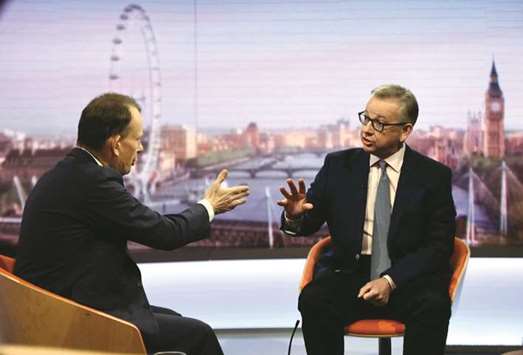Michael Gove has launched a robust defence of university tuition fees, saying graduates should “pay something back”, after Theresa May’s close ally Damian Green called for a debate about the issue.
Gove, who was brought back into the cabinet as environment secretary in the modest post-election reshuffle, said placing the burden on graduates was the fairest way of ensuring universities were properly resourced.
“If we have to fund higher education, and if people who get university degrees go on to earn well, they should pay something back, which is what the current system does,” he said. “It’s wrong if people who don’t go to university find that they have to pay more in taxation to support those who do.”
A proposal to abolish the charge of up to £9,000 a year for university students became a rallying cry for Jeremy Corbyn’s Labour party during the general election campaign and was widely regarded as having helped to boost support among younger voters.
Speaking at a conference in London on Saturday, Green, who as first secretary of state is effectively May’s deputy, said it was one of the issues the Conservative party must consider carefully as it learned the lessons of the election result.
But the Universities Minister, Jo Johnson, was among those who responded by defending the current system.
And speaking on the BBC’s Andrew Marr Show, Gove said: “I believe fundamentally that the purpose of government policy is to support everyone equally, and if you don’t benefit from a university education, you shouldn’t have to pay additionally to support those who do.”
The environment secretary also suggested he was in favour of ending the across-the-board 1% pay cap for public sector workers, saying the government should heed the advice of the public sector pay review bodies.
Some of the eight pay review bodies have already begun to issue warnings about the problems of recruitment and retention if the cap persists until 2019-20, as the Treasury currently intends.
They give advice in the context of government policy, taking the 1% cap as a starting point, but Gove said: “They take account of that, but they also take account of other questions as well.”
He said: “These pay review bodies have been set up to ensure that we can have authoritative advice on what is required in order to ensure that the public services on which we rely are effectively staffed, and that people within them are effectively supported.”
A growing number of ministers, including the Health Secretary, Jeremy Hunt, and the Education Secretary, Justine Greening, are urging the chancellor to make more funds available in the autumn budget to lift the cap.
Gove also defended the Conservatives’ deal with Northern Ireland’s Democratic Unionist party to shore up May’s minority government, at a cost of more than £1bn in additional investment.
“The reason why we are investing in Northern Ireland – and it’s not just DUP voters, it’s all the people in Northern Ireland who are getting this additional investment – is that there are some unique problems that flow from the Northern Ireland Troubles,” he said.
He said it was unfair to the people of Northern Ireland to characterise the payment as a “bung”.
Gove also pointed out that some aspects of the agreement would benefit voters across the UK, singling out the retention of the triple-lock on pensions. A Tory manifesto pledge to do away with it was ditched at the behest of the DUP. Pressed on how the extra money would be found, he said: “It comes, as all other taxpayers’ money comes, from you and I and other hardworking people.”

Secretary of State for Environment, Food and Rural Affairs, Michael Gove, speaks on the BBC’s Andrew Marr Show in London yesterday.
